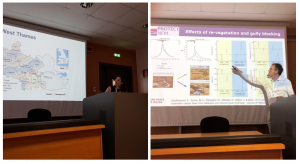In early July members of Protect-NFM and LANDWISE headed to Milan for the 10th IALE World Congress to chair and present in a session on Working with Natural Processes (WWNP). Natural flood management is closely aligned with WWNP, with the common goals of restoring the natural functions of the landscape to reduce flood and erosion risk, whilst delivering co-benefits to the wider environment. Both sit very well within landscape ecology through understanding the importance of landscape pattern and process at different scales, the value of co-production and stakeholder engagement, and providing evidence to influence policy.
The session started with talks on decision making tools to assess the scope and effectiveness of WWNP. Anda Ruskule from the Baltic Environmental Forum in Latvia presented work from the ENGRAVE project, aimed at enhancing river-based green infrastructure by integrating ecosystem and landscape concepts into the planning and management of lowland rivers. Francesco Pugliese from the University of Naples, Italy followed, presenting preliminary results from the PHUSICOS project which aims to assess effectiveness of Nature Based Solutions designed to reduce extreme events in vulnerable areas.
Next up were the papers from the NERC-NFM programme. Angie spoke first, detailing LANDWISE’s work exploring the acceptability and feasibility of different Natural Flood Management measures in the West Thames catchment, and the evidence needed to support decision-making. Soil and land-use management, run-off pathway management, and leaky barriers were regarded among the most feasible and acceptable NFM measures for the catchment area, and experiential and relational evidence were favoured most, whereas technical models were the lowest scoring evidence type across groups. Angie’s presentation is available here. Martin followed for Protect-NFM, presenting on variability in storm responses in peatland headwater catchments and preliminary results suggesting that Sphagnum planting slows the flow of water across hillslopes, indicating the NFM potential through this kind of upland peatland restoration.
Finally, we left Europe for Asia with two talks from Japanese colleagues. Tomohiro Ichinose from Keio University (Japan) presented an outline of a new project in Japan which aims to develop a collaborative network of sustainable regions and an innovative post-disaster revitalization approach using Eco Disaster Risk Reduction and Working with Natural Processes (WWNP) to deliver sustainable management and ecosystem benefits. Finally, Katsue Fukamachi from Kyoto University (Japan) presented work on the use of traditional knowledge of the local ecosystem and local history of disasters formed over centuries to inform current flooding and sedimentation disaster risk reduction on the west side of Lake Biwa, Japan.
We concluded our session with a discussion to draw out common themes and ways of moving forward which centred around:
- The importance of scale and the challenges of up-scaling observed plot/small catchment scale impacts to the landscape as a whole
- Locational issues – often benefits are downstream from where a measure is implemented, so the benefits are often felt in different areas to where the costs are felt (e.g. through loss on land).
- The importance of stakeholder engagement and partnership working in decision making and the implementation of WWNP schemes.
- Tried and tested but expensive civil engineering approaches versus less proven but cheaper and flexible work with natural processes.
- The multiple benefits provided by nature-based solutions.
Thanks to all our wonderful presenters and everyone who contributed to the discussions at the end. We are in the process of writing of an agenda setting paper on how WWNP contributes to landscape ecology, focusing on case studies of the work presented in the session.
Emma Shuttleworth (Protect-NFM, session chair) and Angie Elwin (LANDWISE, session organiser) on behalf of Jess Neumann (LANDWISE, lead session organiser), Chris Short (LANDWISE, session organiser).

Angie Elwin (left) and Martin Evans (right) presenting at the conference
Angie’s presentation is available here.

